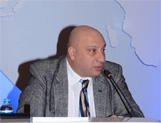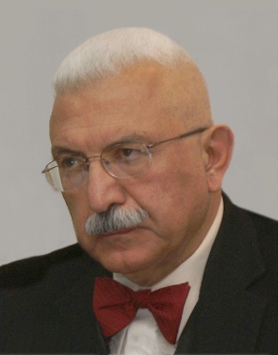The Number of People in Extreme Poverty Reaches Historical Minimum  By Nika Chitadze, PhD, Director, Center for International Studies, International Black Sea University, Tbilisi By Nika Chitadze, PhD, Director, Center for International Studies, International Black Sea University, Tbilisi
As good news is less scandalous, it is rarely spread. However, it is necessary to point out that the percentage of people, who live in poverty, reached a historic minimum in 2018. Unfortunately, there was no appropriate reaction of the international community regarding this development.
Over the last 30 years, the number of people who live in poverty has decreased by 1 billion.
READ MORE
Ecological Problems of the Modern World and their Impact on International Politics  By Nika Chitadze, PhD, Director, Center for International Studies, International Black Sea University, Tbilisi By Nika Chitadze, PhD, Director, Center for International Studies, International Black Sea University, Tbilisi
Environmental resources such as water and air have always been necessary for human life and human activities. For the majority of human history, the environment did, however, not represent a problem for mankind and its sustainable development. The environment and the natural resources satisfied the needs of the people, without causing damage to the next generations. In the second half of the 20th century, the topic of environmental protection has entered the political agenda, because humanity’s economic activities have raised environmental pollution to a level that threatens various species and even the ecosystem as a whole.
READ MORE
Main Challenges on the Way of European Integration of Ukraine and Georgia. Comparative Analysis  By Nika Chitadze, PhD, Director, Center for International Studies, International Black Sea University, Tbilisi By Nika Chitadze, PhD, Director, Center for International Studies, International Black Sea University, Tbilisi
Since the first years of the restoration of independence, Georgia and Ukraine tried to establish close relations with the European Union. In the beginning of 1990’s, the European Union had already its own concrete position towards both states and considered the development of a regional partnership with post-Soviet republics as a main goal. The EU was promoting the integration of the new independent states to the international community and providing internal stability. EU’s CFSP was taking into consideration the same strategy toward all the post-soviet republics – Russia, Ukraine, as well as the South Caucasus or the Central Asian states. The purposes of EU on the way of transformation of those republics were practically similar.
READ MORE
A Paradigm Based upon the Madrid Principles Is Not Acceptable for either Armenia or Karabakh  By Benyamin Poghosyan, PhD, Executive Director, Political Science Association of Armenia By Benyamin Poghosyan, PhD, Executive Director, Political Science Association of Armenia
Since the victory of the "Velvet Revolution" in Armenia, the key foreign policy issue facing the new Armenian authorities is the Karabakh conflict. The negotiation process has been stalled since the failed Kazan summit in June 2011, and the April 2016 four day war made any possible movement forward even less likely. The negotiations after April 2016 were focused on the launch of confidence building measures including the establishment of the ceasefire violations investigation mechanisms and the increase of the OSCE monitoring mission personnel. However, even these modest goals were difficult to achieve as Azerbaijan was urging for a start of "substantial" negotiations on issues of territories and status, otherwise perceiving the confidence building measures as a way to cement the current status quo. READ MORE
Bolton's Caucasian Tour and Russia's Reaction  By Eduard Abrahamyan, Wider Black Sea & Central Asia regional security analyst By Eduard Abrahamyan, Wider Black Sea & Central Asia regional security analyst
On October 24-26, a U.S. State Department delegation headed by National Security Adviser Ambassador John Bolton visited the South Caucasian republics after talks in Moscow. The delegation’s visit to Azerbaijan, Armenia and Georgia was immediately dubbed a reinvigoration of U.S. policy towards the Caucasus and a pragmatic reengagement with the conflicted region. Bolton appeared to refine the evolving U.S. priorities with each country, categorizing them in accordance with political capabilities, shared interests and the roles that Georgia, Azerbaijan and Armenia respectively seek in relations with the West. The visit, however, caused an angry reaction from Moscow, especially given the issues Bolton raised in Yerevan. READ MORE
Could Vladimir Putin’s Visit to Azerbaijan Shift the Regional Balance of Power?
 By Fuad Shahbazov, Baku-based independent regional security and defence analyst By Fuad Shahbazov, Baku-based independent regional security and defence analyst
Russian President Vladimir Putin paid a surprise official visit to Azerbaijan, on September 27. The formal reason for his arrival was to hold talks with Azerbaijani President Ilham Aliyev as well as to jointly attend the Ninth Interregional Russia-Azerbaijan Forum. Local mass media in both Azerbaijan and Russia described Putin’s visit as a next significant step in improving the strategic partnership between the two countries. READ MORE
- December 11, 2018 06:35AM
China – US Relations: The Need for Talks to Overcome Misperceptions  By Benyamin Poghosyan, PhD, Executive Director, Political Science Association of Armenia By Benyamin Poghosyan, PhD, Executive Director, Political Science Association of Armenia
As experts and politicians all over the world seek to grasp the key contours of emerging world order, sometimes dubbed the Post-Post-Cold War Era, there are few things agreed upon by the vast majority of them. Only one issue is clear: US – China relations will define the course of the 21st century. Will the US be able to accommodate the rise of China, keeping its role as a top global power? Will China be ready to be a part of the Western-created world order? Or will it try to do that, simultaneously amending it to Beijing’s goal to establish China as a centered global order? READ MORE
Emerging Global Order: Implications for the Regional Geopolitics  By Benyamin Poghosyan, PhD, Executive Director, Political Science Association of Armenia By Benyamin Poghosyan, PhD, Executive Director, Political Science Association of Armenia
The current phase of the international relations can be best characterized by one word – transition. The Post-cold war order is rapidly disappearing creating strategic ambiguity for all actors. The U.S. hegemony is over or close to over despite the fact that militarily Washington will be far from the reach for several decades to come. However, growing national debt, looming crisis in social security and Medicare systems, uncontrolled migration, growing populism, and partisan fighting does not bode well for the future U.S. dominance. READ MORE
- November 26, 2018 20:36PM
Is this the end for the post-Cold War world order?  By Benyamin Poghosyan, PhD, Executive Director, Political Science Association of Armenia By Benyamin Poghosyan, PhD, Executive Director, Political Science Association of Armenia
The G7 and Shanghai Co-operation Organisation summits last week highlighted the decline of western dominated post-cold war order, and a growing role for regional powers in their respective zones of influence.
Last week world attention was focused on two key international summits - the G7 in Canada and the Shanghai Cooperation Organization (SCO) meeting in China. The first was a gathering of advanced economies, with established democratic institutions and traditions, the second a summit of the "rising others", including two giants - China and India - as well as Russia, desperately vying for a seat at the table of global powers. READ MORE
The Limits of Changing Armenian Foreign Policy after the “Velvet Revolution”  By Benyamin Poghosyan, PhD, Executive Director, Political Science Association of Armenia By Benyamin Poghosyan, PhD, Executive Director, Political Science Association of Armenia
The April – May 2018 “Velvet Revolution” in Armenia caught many by surprise. A few, if any, domestic or foreign experts anticipated such a quick removal from power of the long-term leader Serzh Sargsyan and the Republican Party. Many questions regarding the factors which facilitated the revolution remained unanswered. However, protest leader Nikol Pashinyan has been elected Prime Minister on May 8, and he will hold that position at least until the snap Parliamentary elections, either in November 2018 or in spring 2019. READ MORE
Pashinyan's timely visit to Georgia  By Benyamin Poghosyan, PhD, Executive Director, Political Science Association of Armenia By Benyamin Poghosyan, PhD, Executive Director, Political Science Association of Armenia
Armenian-Georgian relations are friendly, regardless of some tensions under the surface. During his visit to Georgia, prime-minister Nikol Pashinyan should focus on pragmatic issues related to transport corridors.
Georgia plays a key role in Armenian foreign policy. Given the absence of relations with Azerbaijan and Turkey Georgia is one of only two gateways for Armenia to connect with the world. Approximately 70 percent of Armenian foreign trade passes through Georgia. The country is the only channel for Armenian business to reach both Russia - a critical market for Armenian exports, and Europe - another key spot for Armenian business especially after 2017 November signature of Comprehensive and Enhanced Partnership Agreement with the EU. READ MORE
Ukrainian Gas Transit: Still Vital for Russian Gas Supplies to Europe  By Jack Sharples, Research Fellow of the Oxford Institute of Energy Studies and EGF Associate Researcher on the External Dimensions of Russian Gas By Jack Sharples, Research Fellow of the Oxford Institute of Energy Studies and EGF Associate Researcher on the External Dimensions of Russian Gas
With European gas import demand having risen substantially since 2014, Gazprom has dramatically increased its sales on the European market. In Q1 2018, Gazprom reported record daily gas exports to Europe in late February and early March. This Comment addresses the question of how those volumes were delivered to the market, and the extent to which the infrastructure for delivery of those volumes was used, highlighting that, in times of peak European gas import demand, full utilisation of the Nord Stream and Yamal-Europe pipelines left Ukraine as the only transit route with spare capacity. READ MORE
Deciphering Russia’s Messages in the Post-Soviet Space  By Benyamin Poghosyan, PhD, Executive Director, Political Science Association of Armenia By Benyamin Poghosyan, PhD, Executive Director, Political Science Association of Armenia
Since the Russia – Georgia war in 2008 one of the key geopolitical features of the post–Soviet space has been the Russian effort to reinstall its influence over former Soviet republics and diminish the role of the Euro-Atlantic community. The 2008 war, the 2014 Crimea crisis, and the ongoing conflict in Eastern Ukraine are examples of Russian use of hard power to pursue geopolitical interests in the region. However, one of the key tools in the Russian arsenal to regain its dominant position within the post–Soviet world is the effective use of propaganda and information campaigns against the Euro-Atlantic institutions. READ MORE
Russian–Turkish Rapprochement: Implications for the South Caucasus  By Benyamin Poghosyan, PhD, Executive Director, Political Science Association of Armenia By Benyamin Poghosyan, PhD, Executive Director, Political Science Association of Armenia
Russia - Turkish relations are going through tremendous transformations. Just two and half years ago, Turkey was a target of harsh Russian criticism, with Moscow accusing Ankara of supporting the Islamic State, assisting various other terrorist groups deployed in Syria, and oil smuggling. However, since summer 2016, bilateral relations have improved significantly. Syria is a stark example of that thaw, seeing Russia tacitly supporting the Turkish incursion into Northern Syria in summer 2016 as well as turning a blind eye to the Turkish offensive in Afrin. READ MORE
The Current State and the Prospects of Armenia - Turkey Relations  By Benyamin Poghosyan, PhD, Executive Director, Political Science Association of Armenia By Benyamin Poghosyan, PhD, Executive Director, Political Science Association of Armenia
Since gaining independence in 1991 Armenia has faced tough challenges in building relations with two of its four neighbors – Azerbaijan and Turkey. Relations with Azerbaijan were mainly influenced by Karabakh conflict. Armenia was supporting Nagorno Karabakh Armenians to defend themselves against Azerbaijani aggression. The end of hostilities in 1994 and the signature of a ceasefire agreement did not bring up peace, and negotiations are still underway, for the last 23 years, to find a mutually accepted settlement. READ MORE
The Russian Hug is Eternal  By By Benyamin Poghosyan, PhD, Executive Director, Political Science Association of Armenia By By Benyamin Poghosyan, PhD, Executive Director, Political Science Association of Armenia
Russian understanding of geopolitics believes in the decisive role of hard power and military might as a key component of both domestic and foreign policy. Russian-led integration projects, aim to include as many post-soviet states as possible, and once in never let them go out.
In recent years one of the main issues in post-Soviet geopolitics is the competition between Russian and EU promoted integration projects. The Eastern Partnership promoted by the EU offers closer ties with Europe through Association Agreements and the establishment of Free Trade Areas, though with no guarantees of membership into the EU. The Russian-led Eurasian Economic Union promotes integration between former Soviet Union states. READ MORE
Tensions test the resilience of the US-Turkey alliance  By Benyamin Poghosyan, PhD, Executive Director, Political Science Association of Armenia By Benyamin Poghosyan, PhD, Executive Director, Political Science Association of Armenia
A raft of issues are complicating relations between long-time allies Turkey and the United States. But both sides continue using diplomatic back-channels to get as many concessions as possible from each other without fatally harming bilateral relations.
US - Turkey relations are probably at their lowest point since the start of the Cold War in late 1940s. Turkey, as a NATO member, played a key role in fortifying the alliance's southern flank against the Soviet threat. The collapse of the Soviet Union created new geo-strategic conditions, and both the US and Turkey were in quest of new rationales for fostering their relationship. In the 1990s, Turkey was perceived in the US as a potential model on how to develop democratic institutions in newly independent republics with Muslim majority populations from the Caucasus and Central Asia. READ MORE
A new crisis in US-Iran relations is unwelcome in the South Caucasus  By Benyamin Poghosyan, PhD, Executive Director, Political Science Association of Armenia By Benyamin Poghosyan, PhD, Executive Director, Political Science Association of Armenia
President Trump's decertification of the Iran deal will put in jeopardy a number of regional projects.
One of the key events shaping the geopolitics of the Middle East in the coming days most probably will be the US President Donald Trump's decision to decertify Iran nuclear deal (formally called the Joint Comprehensive Plan of Action - JCPOA), signed in 2015. President Trump has been a vocal opponent of the deal since he entered the Presidential race, and continued his tough stance on Iran after his election. The latest vivid example of this approach was President Trump's speech at the 72 Session of the UN General Assembly in September. READ MORE
Is a new U-turn possible in Armenia-EU relations?
 By Benyamin Poghosyan, PhD, Executive Director, Political Science Association of Armenia By Benyamin Poghosyan, PhD, Executive Director, Political Science Association of Armenia
Chances that Armenia will change its mind again about its relations with the EU are low, but this can still happen if Russia's relations with the west deteriorate further.
On March 21, 2017, Armenia and the EU initialed a new Comprehensive and Enhanced Partnership Agreement. This achievement was perceived as a critical step forward in fostering bilateral relations following a period of bitter disappointment in both Brussels and among the pro-European Armenians after the abrupt decision by Armenia, in September 2013, to withdraw from its negotiated Association Agreement with the EU, while choosing to join instead the Russia led Eurasian Economic Union - EAEU. READ MORE
Russia Seeks Increased Control of Karabakh Resolution After Clashes Between Armenia and Azerbaijan*
 Armen Grigoryan, Armen Grigoryan,
EGF Guest Contributor
After the recent clashes between Armenian and Azerbaijani forces, Russia’s leadership attempts to act more decisively in order to compromise the OSCE Minsk Group mediation efforts and to compel Armenia and Azerbaijan to accept Russia’s special role in the region. Russia’s proximity and strong influence over political elites and societies gives it an advantage over other Minsk Group co-chairs – the U.S. and France. However, the lack of security guarantees and economic perspectives may induce Armenia to start reviewing its attitudes concerning relations with different international actors and regional integration frameworks. READ MORE
This article was first published by the "Central Asia-Caucasus Analyst, Central Asia-Caucasus Institute & Silk Road Studies Program Joint Center" which holds the copyright for it.”
- November 25, 2014 20:55PM
Armenia's Increasing Dependence on Russia*
 By Armen Grigoryan, By Armen Grigoryan,
EGF Guest Contributor
Armenia’s Russia-imposed self-isolation from the democratic international community continues and threatens to have economic and social consequences for the country. Russia is increasing its pressure in the South Caucasus, raising the specter of regional destabilization. While Russia already controls the most important sectors of Armenia’s economy, it seems set to reinforce its interests in the country so as to ensure that a fully dependent, loyal Armenia can constitute a tool for the projection of Russia’s political and military influence in the region. Russia’s overt attempt to fulfill its expansionist ambitions endangers the sovereignty of its neighbors, as well as regional stability and energy security. READ MORE
* This article was first published by the "Central Asia-Caucasus Analyst, Central Asia-Caucasus Institute & Silk Road Studies Program Joint Center" which holds the copyright for it.”
- September 4, 2014 09:01AM
Exploring the Role of Economic Initiatives as Peace Building Tools in the Nagorno-Karabakh Context A highly successful roundtable discussion on Exploring the Role of Economic Initiatives as Peace Building Tools in the Nagorno-Karabakh Context took place on the 27th of March, 2014, at the European Parliament. The event was organized by the European Geopolitical Forum and international NGO partners, and was attended by more than 40 experts from the South Caucasus region and Brussels-based think tanks and international organizations who engaged in discussion in a constructive, informal ‘atmosphere of exchange’. The roundtable focused constructive energies on discussing a common future in an economically integrated South Caucasus, as a way to build mutual trust aimed at helping to overcome the current stalemate within the political and security negotiations.
As part of its work, EGF recently published a study entitled “A Pragmatic Review of Nagorno-Karabakh Conflict Resolution: Could Economic Incentives Help Break the Deadlock?”. While this research was well received by stakeholders monitoring developments on Nagorno-Karabakh, the study concluded that economic incentives, on their own, could not substitute for a political settlement to the conflict itself. We were subsequently invited by Armenian, Azerbaijani and international stakeholders to expand on the above-mentioned research. Consequently, in 2014, EGF has deepened its existing research on ‘economic incentives as peace building tools in the unresolved conflict over Nagorno-Karabakh’, and has planned to publish a new study towards the end of the year. This research will include extensive outreach activity consisting of consultation rounds with stakeholders and presentation of the research findings.
The roundtable discussion on the 27th of March was the first outreach event, and it comprised three main interactive discussion sessions. Each session was initiated by a few ‘discussion openers’, and followed by fully interactive dialogue under the Chatham House Rule. Participants agreed that this roundtable should not be a one-of event, but it should lead to further dialogue on economic issues among experts and businesses, while opening a new section of Track 2 efforts for conflict resolution. For the programme, pictures of the event, and biographies of speakers and participants from the region, please click here. A more detailed follow-up report is forthcoming.
A Russian-American-Syrian Triangle: The Syrian Chemical Weapons and American-Russian Relations  By Professor Andrei Kreutz,
By Professor Andrei Kreutz,
EGF Adviser on Trans-Atlantic Security
During the last few weeks, the Syrian-American-Russian triangle directly or indirectly involving all Syria’s neighbors and a number of other nations, has become one of the major focuses of the political commentaries. The Russian initiative to help disarm Syria from its chemical weapons and Putin’s article which was published in the New York Times on September 11, 2013 apparently contributed decisively to prevent a new American military intervention in the Middle East, and brought Russia and its leader world-wide public attention, unknown since the collapse of the Soviet Union. According to the well-known American political analyst George Friedman, for the first time since the early 1990s, the Russian Foreign Minister Lavrov was able to sit with US State Secretary Kerry as an equal.
READ MORE
On the CSTO priorities in ensuring stability in Central Asia in terms of the withdrawal of coalition forces from Afghanistan  By Major-General, Doctor of Political Science, Hayk Kotanjian By Major-General, Doctor of Political Science, Hayk Kotanjian
Guest contributor to EGF
On October 10 2013, within the framework of the Kyrgyz Republic’s chairmanship in the CSTO, an academic-practical conference “Afghanistan 2014: Prospects of the situation in the Islamic Republic of Afghanistan, challenges and threats to security in Central Asia in the context of the withdrawal of main contingents of the International security assistance force" took place in Bishkek. Experts from 27 countries, as well as from the CSTO, NATO, the UN, the OSCE, the EU, the SCO, the ICRC and other international organizations attended the conference. READ MORE
Armenia's choice of the Eurasian Union: A stunning end to its European integration?  George Vlad Niculescu,
George Vlad Niculescu,
Head of Research, The European Geopolitical Forum
The announcement at the beginning of September 2013, in Moscow, by President Serzh Sargsyan of Armenia's decision to join the Russia-led Eurasian Customs Union (ECU) apparently took many by surprise. Firstly, because in July 2013 Armenia concluded a lengthy four years negotiation on essential agreements, meant to upgrade its ties with the European Union (EU), which would be incompatible with joining the ECU. Secondly, because until recently (i.e. the run-up to the Vilnius Eastern Partnership summit to be held this fall) enlargement didn't seem a top priority for the ECU, the focus being more on making the customs union mechanisms effectively work for the existing membership. READ MORE
- September 27, 2013 10:54AM
|
|